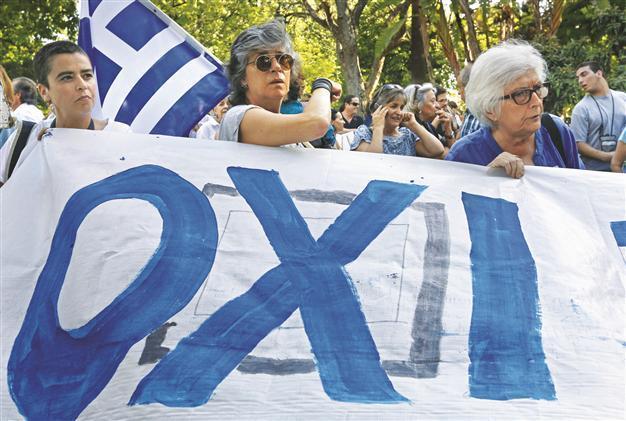Euro’s future in doubt after Greek ‘Oxi’ vote
ATHENS / BERLIN / BRUSSELS

AFP photo
Greece and its eurozone membership face an uncertain future, with time pressing for the country to reach a bailout deal with creditors after Greeks rejected the notion of more austerity in exchange for aid, although European Commission representatives have insistently claimed the opposite.After the Greek referendum on July 5, many are left to wonder if Greece is so starved of cash that it could be forced to start issuing its own currency again and become the first country to leave the eurozone.
After five years of economic crisis and mass unemployment, Greek electors voted 61.3 percent ‘No’ (‘Oxi’ in Greek) to the bailout conditions rejected by their radical leftist government.
“You made a very brave choice,” Greek Prime Minister Alexis Tsipras said in a televised address late July 5, as jubilant supporters thronged Athens’ central Syntagma Square to celebrate the act of defiance against Europe’s political and financial establishment.
“The mandate you gave me is not the mandate of a rupture with Europe, but a mandate to strengthen our negotiating position to seek a viable solution,” he said, as quoted by Reuters.
A both expected and unexpected chain of events has followed the referendum night. One of the most unexpected was news from Greece early yesterday that the country’s outspoken finance minister had resigned, removing a major obstacle to any deal to keep Athens in the eurozone.
Varoufakis steps down
Yanis Varoufakis, an avowed “erratic Marxist” economist who infuriated eurozone partners with his unconventional style and hectoring lectures, had campaigned for Sunday’s sweeping ‘Oxi’ vote, accusing Greece’ creditors of “terrorism.”
“I was made aware of a certain ‘preference’ by some Eurogroup participants and assorted ‘partners’ for my... ‘absence’ from its meetings; an idea that the prime minister judged to be potentially helpful to him in reaching an agreement,” Varoufakis said in a statement, as quoted by Reuters.
Greece and its creditors, who will meet again today to discuss how to keep the country in the euro, remain far apart on key issues, particularly the notion of debt relief. Even their most recent announcements have showed deep differences.
One of the first announcements from a big EU member came from France. French Finance Minister Michel Sapin said early yesterday it was up to the Greek government to make new proposals after a referendum rejecting creditors bailout proposals.
“The vote itself solves nothing,” Sapin said, in the first reaction from Europe’s second economy, adding the margins for dialogue were “very thin,” as quoted by Agence France-Presse.
“Europe is facing a difficult moment but it is not in difficulty itself,” said Sapin.
“Europe will show it is strong by protecting itself,” he added.
Sapin’s announcement was followed by a statement by the economy minister of Spain, which encouraged Greece to ask for a third rescue package.
Spain is open to negotiating a new bailout for Greece, which should remain in the eurozone, Economy Minister Luis de Guindos said early yesterday.
Athens “has the right to ask for a third rescue package. The Spanish government is open to these negotiations,” he told a news conference, as quoted by several news agencies.
Almost everyone eyed what Germany would say about Greece’s decision. The first reaction from the country was a bit discouraging.
Germany early yesterday dismissed Greece’s bid to clinch a quick new debt deal and made comments about Varoufakis’ resignation.
“It is not about people but rather positions,” Chancellor Angela Merkel’s spokesman, Steffen Seibert, said, adding there is currently “no basis to enter into negotiations on a new aid program,” as quoted by AFP.
Merkel, Tsipras speak
Tsipras finally spoke with Merkel by phone yesterday afternoon and agreed to present a Greek proposal for an aid deal at today’s EU summit, a Greek government official said, as quoted by Reuters.
The official, who spoke on condition of anonymity, gave no further details of the call.
Eurogroup chief Jeroen Dijsselbloem then said the results of Greece’s resounding ‘No’ to further austerity measures has brought Europe “no closer to a solution” to Athens’ financial situation.
“The referendum’s result... does not bring us closer to a solution,” Dijsselbloem, who is also the Dutch finance minister, told journalists in The Hague, ahead of a meeting with Prime Minister Mark Rutte, as quoted by AFP.
“If anything, the fact that suggestions were turned down, makes it even more difficult,” Dijsselbloem said, adding he would meet other Eurogroup finance ministers in Brussels today ahead of a eurozone summit.
Now the all eyes will be on today’s EU summit and the European Central Bank’s (ECB) possible decision as, until now, the ECB has agreed to keep Greek banks, and by extension the debt-wracked Greek economy, on life support via the eurozone’s Emergency Liquidity Assistance or ELA facility.
But the overwhelming ‘No’ vote has made it more difficult for the ECB to justify keeping that lifeline open.
“The ECB’s hands are tied by rules,” the head of the Austrian Central Bank, Ewald Nowotny, told the public broadcaster ORF, as reported by AFP.
“We have to assess the situation each time anew. And I’m afraid that events in Greece have not made it easier for us,” Nowotny said.
Greece defaulted on an International Monetary Fund (IMF) loan repayment last week, becoming the first developed nation to do so.
















